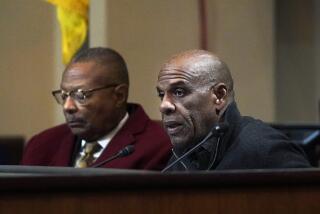Sins of the dictator
- Share via
To what degree is the elected government of Iraq obligated to pay for the sins committed by the late dictator Saddam Hussein? Should neighboring Kuwait forgive Iraq’s new leadership $24 billion in outstanding debt for the destruction wrought by the 1990 invasion, a seven-month occupation, looting and the violent retreat of Iraqi forces? And is it relevant that Iraq may need the money more than Kuwait does? These are some of the questions the United Nations Security Council must consider when it addresses Iraqi Prime Minister Nouri Maliki’s request to release his country from the remaining sanctions imposed after the 1991 Gulf War, including a requirement that the country use its oil revenues to pay reparations.
The U.N. Compensation Commission calculated that Iraq owed $50 billion to victims of the invasion, most of it to Kuwait, and the Security Council set aside 30% of Iraqi oil revenues to pay the debt. That was later cut to 5%, and having paid half the debt, Iraq now wants it reduced further or eliminated. The Iraqi government acknowledges that Kuwait is legally entitled to the compensation, but says that it’s an undue burden on a country that was itself victimized by Hussein’s regime, and that the money is needed to rebuild after the U.S. invasion and ensuing war. President Obama said last week that he would push the United Nations to lift the so-called Chapter 7 sanctions because Iraq no longer poses a threat to its neighbors.
Kuwait argues that the claims were calculated fairly and that international law binds a government to pay the state’s debts regardless of who is in power; to forgive this would be to send the wrong message to aggressor nations. Moreover, the two countries have unresolved border and maritime disputes, as well as issues of missing Kuwaitis and government archives to be addressed under the sanctions.
Distrust runs high. Some Iraqis point out that Kuwait supported Hussein’s repressive rule as a bulwark against Iran until it finally felt his aggression itself. Some Kuwaitis suspect that Iraq still has designs on their territory. Many Kuwaitis and other Sunni Muslims see the new Iraqi government as a proxy for Iran and are happy for the country to remain weak.
Yet an unstable Iraq serves no good purpose. Plenty of bankers would give their eye teeth for 50 cents on a dollar owed, and Kuwait already has received that. Iraq’s political and economic development is in the interest of its neighbors, as well as of the United States. Kuwait should consider reducing reparations, and its proposal to reinvest some of the remaining debt in Iraq would benefit both countries. In return, Iraq should act quickly and decisively to resolve the other outstanding issues of concern to Kuwait, proving itself to be a good neighbor.
More to Read
Sign up for Essential California
The most important California stories and recommendations in your inbox every morning.
You may occasionally receive promotional content from the Los Angeles Times.











